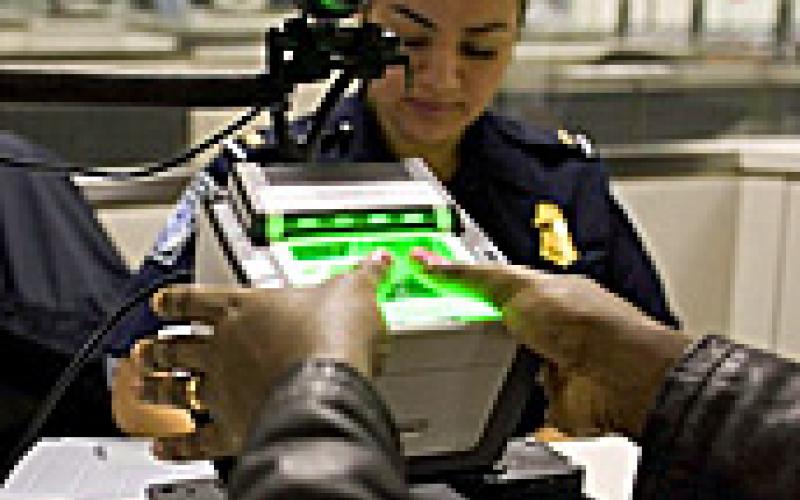
Finger-printing in the visa application process for visitors to the US and UK concerns millions of people. One Chinese academic has decided not to visit the countries in protest at 'this uncivilised measure'.
My name is LI Anshan and I am a professor of history at the Center for African Studies, School of International Studies at Peking University. I have visited the US and UK several times and exchanged ideas frequently with colleagues of both countries. Yet I decided not to visit the US and UK anymore when finger-printing was adopted as a measure for visa application purposes.
I called this the ‘barbarianization of civilization’, since both the US and UK are regarded as two great civilized countries, yet the measure of finger-printing is recognised as a barbarian one. More than 100 years ago, the Asian community, both Indians and Chinese, protested in South Africa (Transvaal) against the measure of ‘compulsory taking of finger-prints’ in the process of re-registration in 1907. The reason for their protest was that in their societies the ‘only people compelled to give fingerprints were illiterates and criminals’. The world famous non-violent humanitarian Gandhi led the Indian community while the Chinese community had its own leader. The two communities united and waged a brave fight against this uncivilised measure.
One Chinese immigrant named Chow Kwai For ‘committed suicide for conscience sake’ during the protest movement. Later, a monument was set up in Braamfontein cemetery, Johannesburg, to memorize him (Melanie Yap and Dianne Leong Man,’Colour, Confusion and Concessions, The History of Chinese in South Africa’, pp.147-149, LI Anshan, ‘A Hisotory of Chinese Overseas in Africa’, pp.199-202).
A barbarian measure of a century ago is now re-adopted in the US and UK, the two most ‘civilised countries’. It is really ironic. What is more, if a country regards the visitor as suspect and a potential enemy, the visitor may become its enemy someday. Is it a hard power or soft power? I don't know. In recent years, I have turned down a few offers from various institutions and universities in the US and UK, including the invitation of last year from Sir John Holmes, the director of The Ditchley Foundation in the UK and Mr. Nathan Harpainter, the intern/Freeman Chair in China Studies Center for Strategic and International Studies (CSIS) in the US. The finger-printing is really humiliating and a lot of my friends who visited the two countries have voiced their grievances, and some share my view or adopted the same action as mine.
The director in charge of China affairs at the Soros Foundation, an organisation which is also opposed to this measure, visited my office several years ago. He agreed with my idea and suggested that I should write an article to express my views. My answer at the time was that the issue was related to the internal affairs of the US and I should not interfere with this. Recently, I received another invitation from Oxford University’s China-Africa Network (OUCAN) for a conference, ‘China as a Development Aid Actor: Rethinking Development Assistance and its Implications for Africa and the West’, which will be held on 14 March in the Department of Politics and International Relations of the University of Oxford. As usual, I thanked them for the generous invitation but politely declined the offer.
My Oxford University colleague, although respecting my decision, kindly advised that I should write an article clearly laying out my views and objections, since ‘this is clearly not just Anglo-Saxon internal affairs but an issue that concerns millions of people who, since the start of the Global War on Terror, have seen their freedoms dramatically curtailed and have gone from being seen as visitors to possible suspects. A powerful testimony from a senior academic like yourself might help stir up much-needed debate on the difficult trade-offs between security, dignity and hospitality.’ I think he is right and thus decided to write this letter to stir up the debate.
I do appreciate various US and UK institutions for their generous invitations and really want to exchange ideas with people from academia, yet I can’t endure (at least for the present) the increasing inhuman measures which go against human conscience. My resistance carries no nationalistic feeling but expresses my humanistic caring, since I really don’t want to see human society progress in the wrong direction. If the Chinese government were to one day use finger-printing as a measure in the application for a visa, I would also protest. Since this matter concerns millions of people who are willing to visit your countries yet have to experience a kind of humiliation during the visa application process, I do hope you may think of other measures and thus coordinate security, dignity and hospitality harmoniously.
Best regards,
LI Anshan
Professor, Peking University
Center for African Studies
School of International Studies
Peking University
- Log in to post comments
- 1949 reads



































